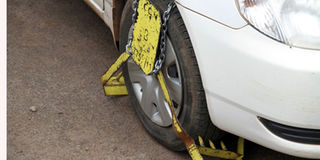WORLD OF FIGURES: City can collect more parking fees by charging less

Long ago, motorists used to pay parking fees through parking meters. PHOTO/FILE
What you need to know:
- Parking inspectors used to walk down the street checking for cars parked next to “expired meters” and issue parking fine notices on their windscreens.
- Many of the parking meter poles are still in place in Nairobi!
Long ago, motorists used to pay parking fees through parking meters. These were coin-activated, mechanical timers located along the streets adjacent to all designated spaces.
The meter would indicate the duration purchased and then a mechanical clock would count down the remaining time.
Upon reaching the end, a red plate would be displayed on the screen.
Parking inspectors used to walk down the street checking for cars parked next to “expired meters” and issue parking fine notices on their windscreens. Many of the parking meter poles are still in place in Nairobi!
For some inexplicable reason, the city authorities were unable to keep the parking meters in good serviceable condition and, gradually, the idea of collecting parking fees died out for several years.
When it was revived in the late 1990s, the hourly charges were abandoned and replaced with a flat daily rate. Monthly and quarterly rates were also introduced.
Starting from Sh50, the daily fee has progressively increased to the current Sh300.
In addition, the method of collecting the money has also moved away from cash payments and manual receipts to mobile phone money and electronic receipts, respectively.
It is an open secret that there is a lot of corruption in parking fee collection. Many motorists pay off parking attendants a small inducement to look the other way for a couple of hours instead of paying the Sh300 daily amount.
I think an hourly parking charge system can help solve this challenge.
Parking fees are collected between 8am and 5pm; that is, a nine-hour shift. So, if an hourly rate of, say, Sh50 was introduced, the county government would collect Sh450 from one space. This is 50 per cent more than the current Sh300.
Since Sh50 is a “more affordable amount,” I think the compliance rate would also increase. But how would the system work?
Well, just the same way as the current one. You park your car and access the parking fee menu on your mobile phone. You chose “Hourly Payment” and pay the Sh50.
On the 50th minute, the system sends you a reminder that your hour is almost over and asks you if you wish to renew.
If you are just about to finish your business, you may ignore the message; if not, you simply pay another Sh50 for one more hour.
What about enforcement: how does the city government ensure that motorists pay? Before rolling out this system, all the parking spaces would be labelled with unique numbers.
Then every 10 minutes or so, the system sends a text message to the parking inspector giving a list of the unpaid spaces along his/her street.
The inspector then goes to those spaces and clamps down any car parked there and levies the usual penalty through the automated system. I think this can work very well for all.




